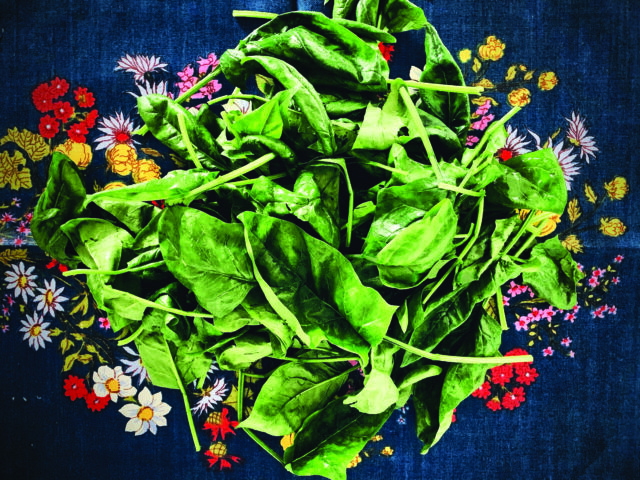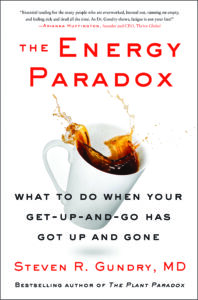
Tired and flagging no matter what diet and lifestyle hacks you try? Dr. Steven R. Gundry has the answers. In his new book The Energy Paradox, co-written with Purist’s Wellness Editor Amely Greeven, one of the world’s top cardiothoracic surgeons and a pioneer in nutrition shares the secrets to getting back your “get up and go.” In this excerpt, he tells how to harness the power of postbiotics—the recently discovered “third P” of your prebiotic-fed and probiotic-filled gut biome:
Of all the jobs your microbes do, the most impressive and important is the manufacturing of digestive byproducts called postbiotics, which are used to communicate information across bodily systems. Postbiotics are your microbiome’s version of text messages, and the emerging research on these gut-derived signaling compounds is quite staggering.
Postbiotics influence your hormone levels, your appetite, your mood; your brain structure, function and development; whether you gain weight or can’t lose it; how well you sleep and whether you get anxiety, along with more serious psychological issues—quite literally the gamut of human experience! Though we are only scratching the surface of how our holobiome directs activities throughout our body, we now know that our gut buddies are constantly sharing all sorts of critical data with our cells via the compounds they make, including postbiotics, even giving instructions to your energy-producing mitochondria.

So, what’s the best source of these important prebiotic foods that fuel the production of postbiotics? Simply: dietary fiber. I’ve found that this nutrient is hugely underappreciated in the American diet—most of my patients have no idea how much fiber they consume in a day. Heck, many of them don’t even know what foods contain fiber! (If you do, congratulations, but trust me, most people do not.) The term “fiber” refers to a variety of complex carbohydrates, including resistant starches and other nondigestible sugars that “resist” being broken down in the small intestine. While the small intestine has the enzymes to digest simple starches (which are made up of lots of sugar molecules strung together in a chain), it lacks the enzymes to break apart resistant starches’ complex, tightly bound sugar molecules or intact cell walls, or both; thus, this fiber passes through relatively unscathed. When you eat “undigestible” carbohydrates, you typically eat them alongside digestible proteins, fats and simple sugars in your meal. The undigestible mix of plant fibers from your salad, sauerkraut or asparagus slows transit of these other foods, keeping the absorption of simple sugars gradual and steady so that your body, and more importantly, your energy-producing mitochondria, can assimilate the nutrients in a slow and steady fashion. Eventually, as components from digested food cross into your bloodstream to provide energy to your cells, the remaining fiber continues on down to the large intestine, and a certain subset of it known as soluble fiber meets its maker: your microbiome.
Now, here’s a bit of a shocking statistic. The diets of our hunter-gatherer ancestors consisted of about 150 grams of fiber per day. The average modern American diet contains about 20 to 25 grams of fiber. (Even with a pretty high vegetable and plant intake, it tends to max out at 60 grams.) And if you are doing a keto diet, you may consume almost no fiber. We live in an age of fiber deficit, and the less fiber we eat, the sicker we get—and vice versa. When your gut buddies aren’t fed the foods they need to make anti-inflammatory, energy-producing signaling molecules (postbiotics), rampant inflammation and exhaustion is likely to take hold. And when you’re dog-tired at the end of the day, it’s a lot more tempting to reach for a bag of chips than to get up off the couch and make yourself a salad.

“OK, doc, I got it,” you may be thinking. “I’ll eat more fiber! I’ll buy some high-fiber cereal or bake a batch of bran muffins and get this issue squared away.” Well, while I’m glad you’re willing to support your gut buddies and make some changes to your diet, I’m afraid those changes are exactly the wrong ones to make.
When you eat a bowl of bran-fiber cereal or a bran muffin, you are not in fact feeding your biome in the way I’ve described, and therefore not getting the health benefits you likely assume. The fact that a whole generation of people was raised on the idea of sitting down to a breakfast full of whole-grain “goodness” has been built on a fundamental misunderstanding (lie?) about the way fiber works.
A diet stripped of fiber deprives the gut buddies downstream in your colon—your soil’s superorganisms, with their incredible processing power—of the raw materials they need to do the important work of guiding the ship. This seemingly small point actually has tremendous consequences. As processed foods and fast foods have increasingly replaced whole foods across the Western world, our gut microbes are going hungry. In fact, new research suggests that the sensations of hunger we experience may actually originate from our microbes sending the message to our brain that they need to be fed! We are literally starving the vital “virtual organ” we need to support our health, and we are paying the price with chronic disease and chronically low energy levels.
When you’re eating the right amount of fiber, you’ll know it—there will be striking evidence. For every pound of these fibers you eat, you make a third of a pound of new bacteria. Meaning, if you eat the right foods, a third of the potential calories you swallow is used to feed them instead of you. It’s like you get to eat 30 percent more food without gaining an ounce! More important, in exchange for feeding them, you will experience a huge improvement in intestinal health and overall energy levels because many of the postbiotic compounds they produce will help heal the gut and boost mitochondrial health. That’s right, they help a leaky gut wall to proliferate strong new cells, which reduces inflammation, which reduces fatigue…all from proper feeding of your gut buddies.
From the book The Energy Paradox by Steven R. Gundry. Copyright © 2021 by Steven R. Gundry, MD. Published on March 16, 2021, by Harper Wave, an imprint of HarperCollins Publishers. Reprinted by permission








